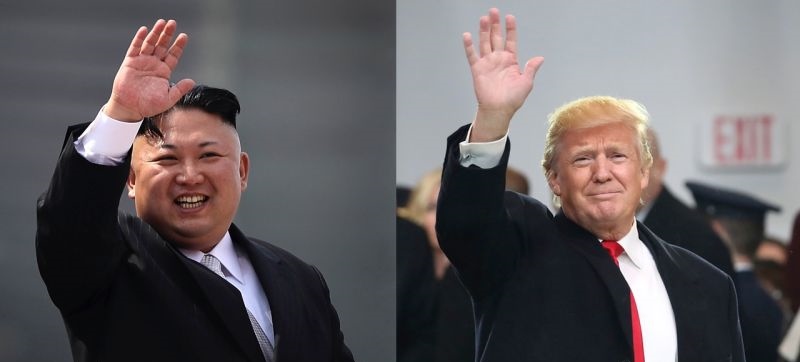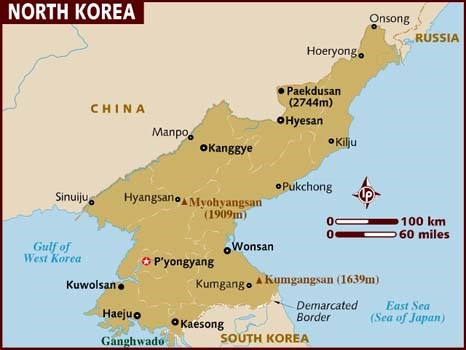North Korea open to dialogue
December 8, 2017 | Expert Insights

Russian Foreign Minister, Sergei Lavrov has revealed that North Korea is open to engage in open discussions with the US. He has passed on the information to his US counterpart, Secretary of State, Rex Tillerson.
Background
The North Korean nuclear program has been a source of concern for the US and the international community for decades. North Korea has remained an isolated nation for decades. Its nuclear program has especially been a concern for the international community. In 2017, North Korea has launched 23 missiles in the span of 16 tests. In November 2017, North Korea after seemingly two months of silence, tested its most potent missile yet. The Hwasong-15 missile reached an unprecedented height of almost 4,500 kilometers (2,800 miles). The Hwasong-15 is a new type of intercontinental ballistic missile. This represents a serious escalation in the stability of the Korean peninsula.
North Korea and Russia (called Soviet Union at the time) were close allies during the Cold War. However, relations between them have loosened since the fall of the Soviet Union. The relationship gained some importance again after Kim Jong-un accepted an invitation to visit Russia (2014–15). The two states share a border along the lower Tumen River. Russia and China are together considered the most important allies for North Korea.

Analysis
In November 2017, North Korea successfully tested a new type of intercontinental ballistic missile, which was its most potent missile yet. The nation claims that this was topped with a “super-large heavy warhead.”
Since then, US and South Korea have conducted military drills. In addition, U.S. and Chinese generals engaged in an unusual set of security talks. This is a rare precedent for both nations and is indicative of the seriousness of the threat posed by North Korea. In the past US President Donald Trump has made it clear that any talks with North Korea will only occur if the nation denuclearizes. In November, he once again iterated that the main goal was to denuclearize North Korea.
Russian Foreign Minister, Sergei Lavrov has now stated that North Korea is open to engage in open discussions with the US. He has passed on the information to his US counterpart, Secretary of State, Rex Tillerson.
“We know that North Korea wants above all to talk to the United States about guarantees for its security. We are ready to support that, we are ready to take part in facilitating such negotiations,” Lavrov said at an international conference in Vienna, according to the Interfax news agency. “Our American colleagues, [including] Rex Tillerson, have heard this.” He did not elaborate on how Tillerson responded.
“In an informal discussion that we had in Stockholm, an official made an observation that there isn’t at present a way for the US and North Korea to work together to prevent an accident. I thought that was an interesting observation that I had not heard them say before,” said Suzanne DiMaggio, a senior fellow at the New America thinktank who has played a leading role in back-channel contacts with Iran and North Korea, and who attended the Stockholm meeting.
Sue Mi Terry, a former CIA analyst said that Washington might also be open to a military hotline being established between the two countries. “I think even this administration recognizes that some sort of an open channel is needed for that, not to negotiate but to have a little more transparency. I think everyone recognizes that is needed. This latest test put a big hole in the possibility of negotiation at this moment. Ambassador Yun might do that but it’s different with the White House. I’m not sure he has strong White House support.”
State Department spokeswoman Heather Nauert said on Thursday that direct talks with North Korea were “not on the table until they are willing to denuclearize.”
Meanwhile, the North Korea has issued its strongest worded statement yet. It stated that the latest drills between South Korea and the US and the constant threats from the US has made war inevitable. North Korea’s Foreign Ministry blamed the drills and “confrontational warmongering” by U.S. officials for making war inevitable. “The remaining question now is: when will the war break out?” it said in a statement. “We do not wish for a war but shall not hide from it.”
Assessment
Our assessment is that the only way to resolve the crisis in the Korean peninsula without resorting to military conflict is through diplomatic dialogue. However, we believe North Korea has put itself in a difficult situation by wanting to establish a direct line of contact with Washington and yet at the same time demanding guarantees from the US regarding its security. As we had mentioned earlier, Kim Jong Un would not want to share the same fare as the former Libyan leader Muammar Gaddafi. It is also clear that both China and North Korea have one common interest – that is to get rid of American military presence in the Korean peninsula. The challenge for each side is to achieve these specific goals. US will expect the shut down the North Korea’s missile program and the North Koreans and the Chinese will expect the Americans leave the Korean peninsula much to the discontent of its Asian allies.








Comments